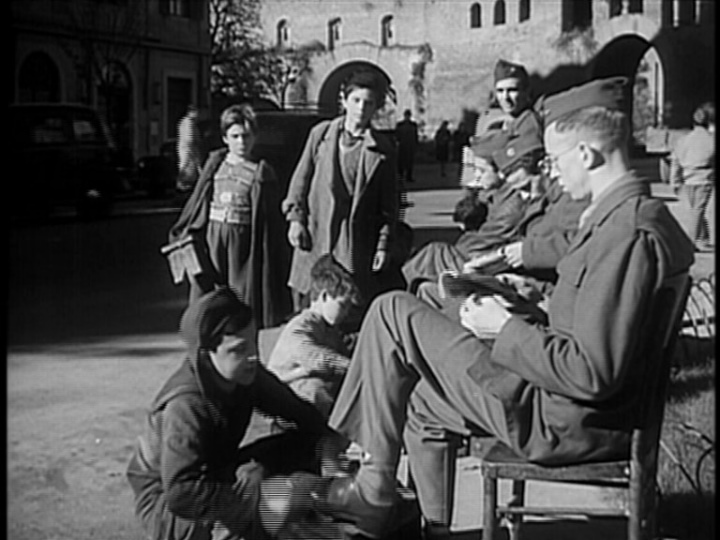
SHOESHINE (Sciuscia)(director: Vittorio De Sica; screenwriters: Sergio Amidel/Adolfo Franci/C. G. Viola/Cesare Zavattini; cinematographer: Carlo Montuori; editor: Eraldo Da Roma; music: Alessandro Cicognini; cast: Rinaldo Smordoni (Giuseppe), Franco Interlenghi (Pasquale), Atiello Mele (Raffaele), Bruno Ortensi (Arcangeli), Leo Garavagila (Commissario), Pacifico Astrologo (Vittorio), Gino Saltamerenda (Panza), Maria Campi (Anselmi); Runtime: 89; MPAA Rating: NR; producer: Umberto Scarpelli; Image Entertainment; 1946-Italy-in Italian with English subtitles)
“When viewed today seems to be in need of a buffing.”
Reviewed by Dennis Schwartz
This is as much a manipulative as a realistic examination of everyday social problems and the haunting effect of poverty on children, who are facing on their own a devastated post-war Italy. It’s directed by Vittorio De Sica (“Miracle in Milan”/”Umberto D”/”The Bicycle Thief”) and mainly written by his longtime collaborator Cesare Zavattini. Much of the low-budget film was shot in the studio over a three month period, and because the location shots were so poorly done it failed to have the fresh overall authentic look of many other neorealist films of the period.
This war-torn story about the coming apart of a friendship of two honest shoeshine boys who unwittingly get mixed up in a black market scheme and are sent to a juvenile delinquency reform school facility with tragic results, gave neorealism its first critical success internationally but flopped both commercially and critically in Italy–they wanted escapist Hollywood films and it was also critically assailed by many who felt that the film exploited the misfortunes of the poor (which I agree with).
The lead two shoeshine boys are effectively played by non-professional actors Rinaldo Smordoni and Franco Interlenghi. It might have been a shocker in its day, but when viewed today seems to be in need of a buffing. Though filled with sentimentality and too simplistic a message to be a meaningful social document, I have to admit it does in a melodramatic way get at the pain of living in such desperate times and shows how the system just didn’t work well enough to help the troubled kids who were desperately in need of a helping hand from the authorities or some responsible adult.
Giuseppe (Rinaldo Smordoni) and Pasquale (Franco Interlenghi) work the streets of Rome hustling shoeshines, especially to American GIs. Pasquale is a homeless orphan, while the younger Giuseppe comes from an impoverished but honest family that live in crowded conditions and are too busy to keep an eye on him. The boys dream of owning a horse together and are saving their shoeshine earnings to buy a certain rental street white horse kept in a stable. They sell on the black market used American blankets to a palmist (Maria Campi), who gets scammed by Giuseppe’s thieving older brother (Atiello Mele) and two other con artists posing as cops. A few days later the kids are arrested in the street when the palmist points them out to the police as accomplices in the crime. When they refuse to squeal, they are sent to reform school and fall in with a bad lot of juvenile delinquents causing them to become embittered and eventually turn against each other in betrayal.
It received a special Oscar before the Academy had a prize for Best Foreign Film.
REVIEWED ON 8/13/2008 GRADE: B